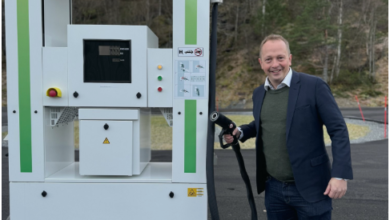Hyzon hydrogen coach in Brisbane; Australia trade to benefit from hydrogen
Hyzon is continuing to innovate with a near-term goal of developing a coach with 800 km range.

Hyzon Motors Inc. has unveiled its first zero-emission fuel cell electric commercial coach in Brisbane, Australia.
It is also the first fuel cell electric coach in Australia. The 50 passenger seat coach has a range of around 700 km with a motor power of 350 kW. It is the first in a ten-coach order to be supplied into Australia; the remaining nine vehicles are in advanced stages of production.
Before delivery, the coach completed a 15,000 km durability test. The initial coaches are designed to meet Australian standards, including a right-hand drive configuration and a design temperature of 55C.
Hyzon plans to offer similar hydrogen coaches to customers globally beginning in 2022. Hyzon will import hydrogen vehicles from its factories internationally, and it expects to localise the production of key platforms in Australia by 2022. The most populous state of New South Wales has already declared their intention to have its entire fleet of more than 8,000 buses operating with zero emissions by 2030, representing an enormous opportunity for fuel cell electric buses.
In another development, the Australian government’s climate policy advisor, the Climate Change Authority (CCA), has released its latest report entitled to trade and investment trends in a decarbonising world. The report looked into the world’s largest economies, including some of Australia’s largest trading partners, such as the EU and US, who are considering carbon border adjustment mechanisms (CBAMs)—taxes on the carbon content of exports from countries without ambitious climate policies. The shifts towards low carbon economies have significant impacts on Australia.
The report explores that Australia enjoys a mix of all the critical ingredients needed to be a significant global player in a thriving clean hydrogen industry. The report highlighted that, among other products, Australia could gain a competitive edge by producing clean exports with low carbon hydrogen with low embedded emissions at a low cost.
